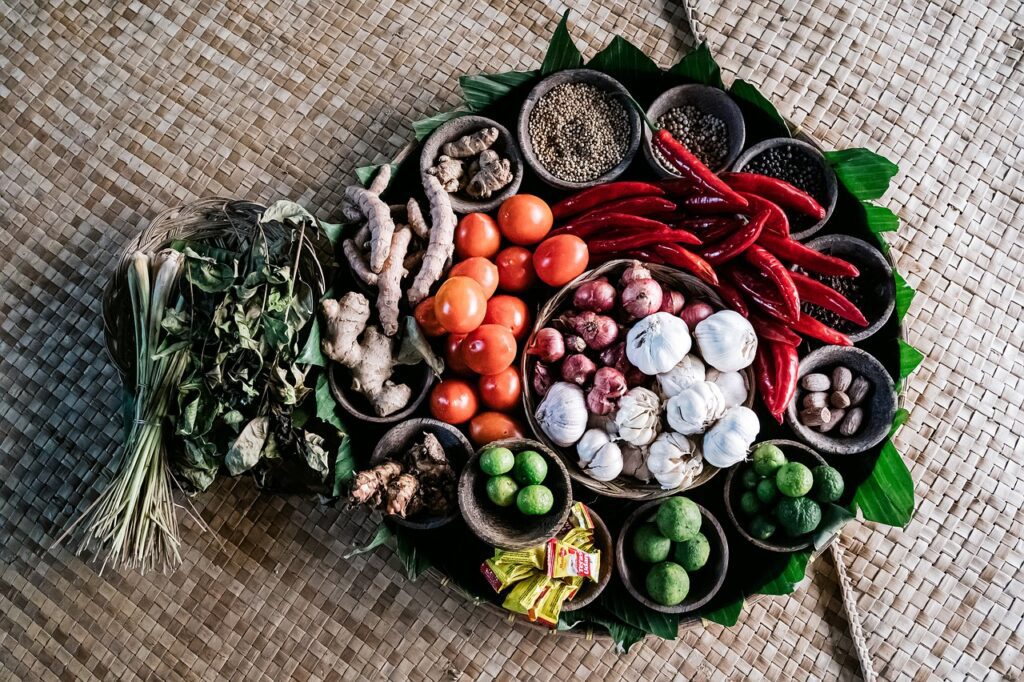When I think of Bali, my mind instantly drifts to its vibrant culinary scene. In 2025, the island’s rich tapestry of flavors promises even more exciting culinary adventures. From bustling local markets brimming with fresh produce to immersive cooking classes, Bali offers a feast for the senses that’s simply irresistible.
Imagine wandering through a traditional market, where the air is filled with the aroma of exotic spices and tropical fruits. It’s here that you can truly connect with Bali’s culinary heart. And what better way to dive deeper into this world than by joining a cooking class? Guided by local chefs, you’ll learn to transform these fresh ingredients into mouthwatering dishes that capture the essence of Balinese culture.
Whether you’re a seasoned foodie or just curious about new flavors, Bali’s culinary experiences in 2025 promise a delightful journey into the island’s rich and diverse food heritage.
Exploring Culinary Experiences in Bali
Bali’s culinary scene offers a unique blend of flavors that excite the senses. Traditional markets are essential stops where tourists mingle with locals and discover fresh spices and vibrant produce. For example, Ubud Market brims with colorful fruits and aromatic herbs that reflect the island’s tropical richness.
Cooking classes provide immersive experiences for those eager to learn Balinese cooking techniques. Expert chefs guide participants through the creation of classic dishes like Nasi Goreng and Babi Guling. These sessions often start with market tours, ensuring the freshest ingredients for the meals.
I recommend visiting the Gianyar Night Market for a taste of authentic street food. It showcases a variety of delicious bites, from satay skewers to sweet treats. By engaging in these culinary experiences, visitors gain a deeper appreciation for Bali’s rich gastronomic culture.
Cooking Classes in Bali
Diving into Bali’s culinary arts offers an immersive way to experience the island’s vibrant flavors. I explore cooking classes that connect deeply with Balinese food culture.
Popular Cooking Schools
Several top-notch cooking schools offer authentic experiences. Bumbu Bali, led by a renowned local chef, provides hands-on lessons in crafting traditional dishes. Paon Bali Cooking Class brings the farm-to-table concept alive, guiding me through rice fields before cooking. At CasCades Cooking Class, I learn gourmet interpretations of Balinese classics, accentuated by stunning views of the surrounding valley.
What to Expect from a Class
Cooking classes often start with a market tour, where I select fresh produce and spices. Sessions typically last three to five hours, covering the preparation of the entire meal. I get insights into spice mixtures, cooking techniques, and plating styles specific to the island’s cuisine. Each session ends with a shared meal, allowing me to savor the dishes I’ve prepared.
Visiting Local Markets
Exploring Bali’s local markets offers a deep dive into the island’s culinary culture. These bustling hubs are brimming with vibrant ingredients and traditional foods.
Must-Visit Markets
A few key markets stand out for their diversity and authenticity. Ubud Market, in the cultural heart of Bali, features colorful fruits and aromatic spices. I’m always captivated by the lively atmosphere and the array of exotic goods. Gianyar Night Market is another favorite, bustling with vendors selling delicious street food like satay skewers and sweet treats. Badung Market, the island’s largest traditional market, provides a fascinating glimpse into day-to-day Balinese life, offering everything from fresh produce to handicrafts.
Understanding Local Ingredients
Local ingredients are essential to Bali’s culinary magic, each bringing unique flavors and aromas. Fresh tropical fruits, like mangoes and bananas, add a sweet touch to many dishes, while spicy chilies introduce a vibrant kick. I find fragrant herbs like lemongrass and turmeric infuse meals with authenticity. While exploring markets, I often encounter base genep, a mix of spices forming the foundation of Balinese cuisine. Understanding these ingredients enhances the overall cooking class experience, allowing deeper connections to the flavors that define Balinese dishes.
Combining Cooking Classes and Market Visits
Pairing cooking classes with market visits in Bali creates a rich and immersive food journey. The hands-on experience of selecting ingredients directly from local vendors enriches the learning process, making the culinary adventure unforgettable.
Tips for a Seamless Experience
Prepare Ahead: Research popular markets like Ubud Market and Gianyar Night Market to identify unique spices and produce.
Stay Curious: Engage with vendors using basic phrases in Indonesian, enhancing interactions.
Dress Comfortably: Wear breathable fabrics and sturdy shoes when navigating bustling market aisles.
Capture Moments: Bring a camera to document vibrant stalls and the process of selecting ingredients.
Stay Hydrated: Carry water to stay refreshed throughout the market and cooking activities.
Benefits of Learning from Locals
Access Authentic Recipes: Local chefs share time-honored recipes that reflect Bali’s culinary heritage, like Nasi Goreng and Babi Guling.
Insight into Ingredients: They explain traditional uses of ingredients like galangal and lemongrass, deepening culinary knowledge.
Cultural Connection: Cooking with locals fosters a sense of belonging and appreciation for Balinese culture.
Unique Techniques: Classes offer unique knife skills and cooking methods specific to Balinese cuisine, enhancing cooking expertise.
Memorable Experiences: Enjoy shared meals with locals and other participants, creating lasting memories tied to Bali’s rich flavors.
Culinary Trends in Bali 2025
Balinese cuisine in 2025 combines tradition with innovation, highlighting a commitment to both flavor and sustainability. The dynamic culinary landscape reflects a growing emphasis on creativity and ethical practices.
Innovations in Balinese Cuisine
Bali’s chefs experiment with traditional ingredients to create unique dishes that captivate locals and tourists. For example, fusion dishes blend Balinese staples like sambal with international flavors, creating new culinary experiences. Molecular gastronomy also gains traction, allowing chefs to reinterpret classics such as Babi Guling with modern techniques. More eateries offer plant-based and gluten-free versions of Balinese favorites, reflecting global food trends and catering to diverse dietary needs.
Sustainability and Ethical Sourcing
Bali’s culinary scene prioritizes sustainability through local ingredient sourcing and waste reduction. Many restaurants collaborate with nearby farmers to acquire fresh, organic produce, boosting the local economy and ensuring food traceability. Chefs increasingly emphasize nose-to-tail cooking, minimizing food waste by using all parts of ingredients. Eco-conscious practices encompass biodegradable packaging and composting, aligning with Bali’s broader environmental goals. Visitors engaging in culinary tours and classes witness firsthand the island’s dedication to sustainable food practices.
Conclusion
Exploring Bali’s culinary scene in 2025 offers an unforgettable journey into the heart of its rich food culture. From vibrant markets brimming with exotic ingredients to hands-on cooking classes led by passionate local chefs, there’s so much to savor and learn. Each experience not only tantalizes the taste buds but also deepens our connection to Balinese traditions and sustainable practices.
Whether you’re a seasoned foodie or a curious traveler, the island’s blend of tradition and innovation promises something special for everyone. As you immerse yourself in the flavors and aromas of Bali, you’re sure to create lasting memories and perhaps even bring a piece of its culinary magic back home.


